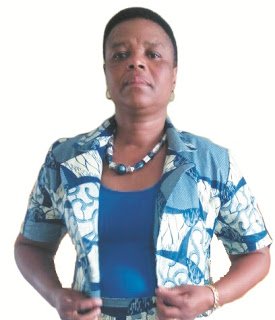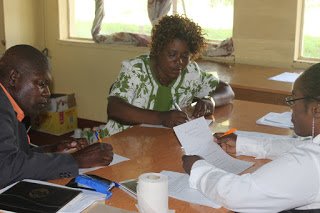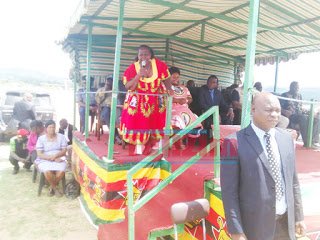Parliamentary portfolio committee for Women’s Affairs, Mucharairwa Mugidho
Moses Ziyambi
“The State must take all practical measures to protect the fundamental rights and freedoms enshrined in Chapter 4 and to promote their full realisation and fulfilment.”
That quotation was taken from Chapter 2 Section 11 of Zimbabwe’s constitution. The section is titled ‘Fostering of fundamental rights and freedoms’.
Chapter 4 contains the ‘Bill of Rights’ – a long list of liberties which analysts say have remained largely utopian due to government intransigence.
These freedoms are civil, political, economic and social rights that citizens of this country must be allowed to enjoy without let or hindrance.
They include freedom from arbitrary eviction, right to fair administrative justice, right to healthcare, freedom to petition and demonstrate, freedom of expression, freedom from inhuman or degrading treatment and the right to human dignity.
However, from the horrifying pictures of a battered and severely injured Lynda Masarira emerging from remand prison, to the various reports of partisan distribution of food aid in the countryside, commentators say the country has badly regressed in 2016.
At the United Nations Human Rights Council’s Universal Periodic Review (UPR) held in Switzerland – at which Zimbabwe presented its own ‘whitewashed’ national human rights report – Western countries asked the country to ratify the Convention against Torture and other Cruel, Inhuman or Degrading Treatment and the International Convention for the Protection of all Persons against Enforced Disappearances but the government seems to be dragging its feet.
The Zimbabwe Lawyers for Human Rights (ZLHR) and the Zimbabwe Human Rights NGO Forum, however, commended the government “for its efforts in producing the national report as well as participation in the Interactive Dialogue during the just ended Universal Periodic Review (UPR) held on 2 November 2016.”
The two organisations have however, frequently clashed with the government over human rights issues and have led calls for the alignment of laws to the new constitution. The ZLHR is also known for defending journalists, activists and victims of political persecution by providing free legal counsel.
Prominent human rights lawyer, Martin Mureri of Matutu and Mureri Legal Practitioners, is of the view that government had flagrantly committed gross acts of rights violations in 2016 as it has always done.
“The government does not respect human rights. They disguise their authoritarianism behind a thin veil of democracy which they easily rip off to show their true colours when confronted by the slightest opposition. Nothing better describes that than the treatment of demonstrators by the police this year,” Mureri says.
There were horrid images of police brutality as the State battled mainly peaceful demonstrators during waves of protests that rocked the country this year.
Stern Zvorwadza, Patson Dzamara, Fani Munengami and Samuel Wadzanai Mangoma are some of the most prominent victims of that brutality who also faced what were widely regarded as trumped-up charges of inciting public violence.
Mureri also criticised the government for violating the rights of Tokwe-Mukosi flood victims, some of whom he represented in court free of charge when they were arrested for destroying a police vehicle while protesting their deplorable living conditions at Chingwizi camp.
In one of its recent report on internally displaced persons, Human Right Watch (HRW) criticises government for mishandling the aftermath of the floods disaster.
“It coerced the flood victims to resettle onto one-hectare plots at a farm with close links to the ZANU-PF party, without paying them fair compensation. The flood victims lacked adequate shelter, safe drinking water, and access to sanitation and health services,” the reports notes.
The HRW report also takes aim at the poor record of children’s rights, lamenting the high prevalence rate of child marriages in the country.
“The government lacked comprehensive strategies to curb the rising practice of child marriage. The United Nations Children’s Fund (UNICEF) said nearly one-third of girls in Zimbabwe marry before their 18th birthday and 4 percent marry before they turn 15,” the report reads.
Early this year, Prosecutor General Johannes Tomana took the flak for making insinuations to the effect that underage girls living in economic hopelessness could consent to marriage if that can improve their lot.
Children’s rights advocacy, My Age Zimbabwe, says child marriages continue to be a serious threat to children’s rights as countless children dropped out of school this year to engage in sex work in such poor districts as Chivi, Gutu and Zaka.
Though the constitution forbids marriage for children under the age of 18, the Criminal Law Codification Act and the Marriages Act do not stop consensual sexual relations between an adult man and a girl who is at least 16 years of age.
Chiredzi proportional representation legislator, who also sits on the parliamentary portfolio committee for Women’s Affairs, Mucharairwa Mugidho says 2016 was full of heartbreaks for children’s rights but her committee will intensify the fight for cohesion in the marriages law.
“We are disappointed by the lack of harmony in our laws. In 2017, we will push for the crafting of a single piece of legislation on marriages and the age of consent. We want 18 years to be the age of consent and permissible marriage so that children can enjoy the right to be children,” said Mugidho.
Hopes for the eventual realisation of diaspora’s right to vote was also dealt a devastating blow this year after Rita Makarau of the Zimbabwe Electoral Commission (ZEC) pronounced that people living in the diaspora cannot cast their ballots unless they come back to do so.
Exiled human rights lawyer and chairperson of the Zimbabwe Exiles Forum (ZEF) Advocate Gabriel Shumba says ZEC’s move was regressive.
Shumba, who survived severe torture after he was abducted in 2003, said several expatriate groups had coalesced under the Diaspora Vote Coalition (DVC) to fight for the right to vote.
“The diaspora vote, as far as Zimbabwe Exiles Forum is concerned, is a non-negotiable right. The Constitution is unequivocally clear on the rights of all citizens to vote. Arguments advanced so far to deny us this fundamental right are unconvincing,” said Adv Shumba.news







